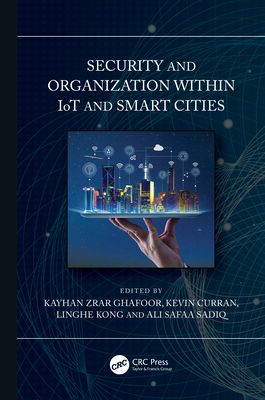商品描述
The IoT topology defines the way various components communicate with each other within a network. Topologies can vary greatly in terms of security, power consumption, cost, and complexity. Optimizing the IoT topology for different applications and requirements can help to boost the network's performance and save costs. More importantly, optimizing the topology robustness can ensure security and prevent network failure at the foundation level. In this context, this book examines the optimization schemes for topology robustness in the IoT, helping readers to construct a robustness optimization framework, from self-organizing to intelligent networking.
The book provides the relevant theoretical framework and the latest empirical research on robustness optimization of IoT topology. Starting with the self-organization of networks, it gradually moves to genetic evolution. It also discusses the application of neural networks and reinforcement learning to endow the node with self-learning ability to allow intelligent networking.
This book is intended for students, practitioners, industry professionals, and researchers who are eager to comprehend the vulnerabilities of IoT topology. It helps them to master the research framework for IoT topology robustness optimization and to build more efficient and reliable IoT topologies in their industry.
商品描述(中文翻譯)
物聯網(IoT)拓撲定義了各種組件在網絡中相互通信的方式。拓撲在安全性、功耗、成本和複雜性方面可能有很大差異。針對不同應用和需求優化物聯網拓撲可以幫助提升網絡性能並節省成本。更重要的是,優化拓撲的穩健性可以確保安全性並防止網絡在基礎層面發生故障。在這個背景下,本書探討了物聯網拓撲穩健性優化的方案,幫助讀者構建一個從自組織到智能網絡的穩健性優化框架。
本書提供了相關的理論框架和最新的物聯網拓撲穩健性優化的實證研究。從網絡的自組織開始,逐步過渡到基因演化。它還討論了神經網絡和強化學習的應用,以賦予節點自學習的能力,實現智能網絡。
本書旨在幫助學生、從業者、行業專業人士和研究人員理解物聯網拓撲的脆弱性。它幫助他們掌握物聯網拓撲穩健性優化的研究框架,並在其行業中構建更高效和可靠的物聯網拓撲。
作者簡介
Dr. Tie Qiu is currently a full professor in the School of Computer Science and Technology at Tianjin University, China. Prior to this, he was an assistant professor and associate professor in the School of Software at Dalian University of Technology. He was a visiting professor in the Department of Electrical and Computer Engineering at Iowa State University in the USA (2014-2015). He serves as an associate editor of IEEE Transactions on Network Science and Engineering (TNSE) and IEEE Transactions on Systems, Man, and Cybernetics: Systems; area editor of Ad Hoc Networks (Elsevier); associate editor of Computers and Electrical Engineering (Elsevier) and Human-centric Computing and Information Sciences (Springer); and guest editor of Future Generation Computer Systems. He serves as general chair, program chair, workshop chair, publicity chair, publication chair, and TPC member of a number of international conferences. He has authored/co-authored 9 books and over 150 scientific papers in international journals and conference proceedings, such as IEEE/ACM Transactions on Networking, IEEE Transactions on Mobile Computing, IEEE Transactions on Knowledge and Data Engineering, IEEE Transactions on Industrial Informatics, IEEE Communications Surveys & Tutorials, IEEE Communications, INFOCOM, and GLOBECOM. His 10 papers are listed as ESI highly cited papers. He has contributed to the development of 4 copyrighted software systems and holds 16 patents. He is a distinguished member of the China Computer Federation (CCF) and a senior member of IEEE and ACM.
Ning Chen is a PhD candidate at Tianjin University. His research focuses on the Internet of Things, including robustness optimization, wireless sensor networks, artificial intelligence, big data analysis, smart city, and Internet of Vehicles. He has published more than 10 papers in leading journals, including two ESI highly cited papers.
Mr. Songwei Zhang is currently a technical engineer at Tianjin University. He has extensive experience in the robustness optimization of Internet of Things topology.
作者簡介(中文翻譯)
田秋博士目前是中國天津大學計算機科學與技術學院的正教授。在此之前,他曾擔任大連理工大學軟件學院的助理教授和副教授。他於2014年至2015年間擔任美國愛荷華州立大學電氣與計算機工程系的訪問教授。他擔任《IEEE網絡科學與工程學報》(IEEE Transactions on Network Science and Engineering, TNSE)和《IEEE系統、人類與控制論:系統學報》(IEEE Transactions on Systems, Man, and Cybernetics: Systems)的副編輯;《Ad Hoc Networks》(Elsevier)的區域編輯;《計算機與電氣工程》(Computers and Electrical Engineering, Elsevier)和《以人為中心的計算與信息科學》(Human-centric Computing and Information Sciences, Springer)的副編輯;以及《未來一代計算機系統》(Future Generation Computer Systems)的客座編輯。他擔任多個國際會議的總主席、程序主席、研討會主席、宣傳主席、出版主席和技術程序委員會成員。他已經撰寫或合著了9本書籍和超過150篇國際期刊及會議論文,包括IEEE/ACM網絡通訊學報、IEEE移動計算學報、IEEE知識與數據工程學報、IEEE工業信息學學報、IEEE通訊調查與教程、IEEE通訊、INFOCOM和GLOBECOM。他的10篇論文被列為ESI高被引論文。他參與了4個著作權軟件系統的開發,並擁有16項專利。他是中國計算機學會(CCF)的傑出會員,以及IEEE和ACM的資深會員。
陳寧是天津大學的博士候選人。他的研究重點是物聯網,包括穩健性優化、無線傳感器網絡、人工智慧、大數據分析、智慧城市和車聯網。他在領先的期刊上發表了超過10篇論文,其中包括兩篇ESI高被引論文。
張松偉先生目前是天津大學的技術工程師。他在物聯網拓撲的穩健性優化方面擁有豐富的經驗。






























